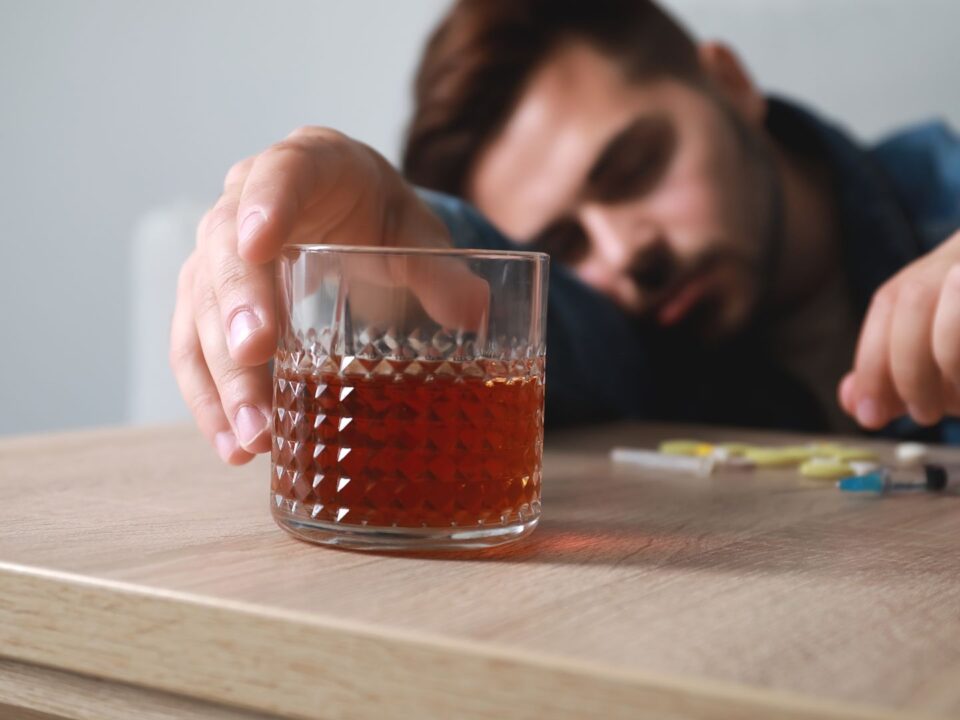
Understanding the Basics of Dialectical Behavior Therapy: A Comprehensive Guide
May 3, 2024
The Red Flags: Is Your Loved One Secretly Struggling with Substance Abuse?
May 3, 2024Do you ever feel like certain situations or emotions make you more likely to turn to drugs or alcohol? You're not alone. We unveil the concept of drug triggers and how understanding them can help you better manage your addiction. Whether it's stress, boredom, or something else entirely, we'll give you practical tips on how to identify and cope with these triggers so you can stay on track with your recovery journey.
Introduction to Drug Triggers
Drug triggers are environmental, social, or emotional cues that can lead a person to use drugs or engage in addictive behaviors. These cues can range from something as subtle as a certain smell or taste to more obvious factors such as stress or peer pressure. Understanding and managing drug triggers is an essential part of recovery for those struggling with addiction.
Understanding Drug Triggers
To effectively manage drug triggers, it is crucial to first understand what they are and how they work. A trigger can be anything that causes a person to crave drugs or feel the need to use them. The most common types of triggers include people, places, emotions, thoughts, and situations.
People: Certain individuals can act as triggers for someone struggling with addiction. It could be an old friend who also uses drugs or a family member who enables their behavior.
Places: Similar to people, specific locations associated with past drug use can trigger cravings. For example, a person may experience intense cravings when passing by their old dealer’s house.
Emotions: Emotions play a significant role in triggering drug use. Negative emotions such as stress, anxiety, and depression can make a person turn to drugs for relief.
Thoughts: Thoughts related to past drug use or memories associated with it can also act as triggers. Even thinking about using drugs could cause cravings for some individuals.
Situations: Certain situations that previously involved drug use (parties, concerts) can become strong triggers for someone in recovery.
Managing Drug Triggers
While avoiding all potential triggers may not always be possible, there are ways to manage them effectively:
1) Identify your triggers: The first step is recognizing which cues act as triggers for you personally. This may require self-reflection and awareness of your own thoughts and behaviors.
2) Develop coping mechanisms: Having healthy coping mechanisms in place is crucial when facing triggering situations. This could include deep breathing exercises, reaching out to a supportive friend, or engaging in a hobby.
3) Create a support network: Surrounding yourself with positive and understanding individuals can help you navigate through triggering situations. Having someone to talk to or lean on when cravings arise can be crucial in managing triggers.
4) Avoid high-risk situations: If possible, it is best to avoid situations that may trigger drug use. This could mean avoiding certain people, places, or events until you feel more confident in your ability to manage triggers.
Drug triggers are an inevitable part of recovery for those struggling with addiction. By understanding what they are and developing healthy coping mechanisms, one can effectively manage their triggers and prevent relapse. With the right tools and support, it is possible to overcome drug triggers and maintain long-term sobriety.
Common Types of Drug Triggers
Drug triggers are specific situations, events, or emotions that can increase the risk of relapse for individuals struggling with substance use disorder. These triggers can be different for each person and understanding them is crucial for successful recovery. In this section, we will discuss some of the most common types of drug triggers.
-
Social Triggers:
Social settings and interactions can often be a significant trigger for individuals recovering from drug addiction. This includes being around people who still use drugs, attending parties where drugs are present, or even simply being in a place where they used to use drugs. These social triggers can evoke strong cravings and intense feelings of nostalgia, making it challenging to resist temptation.
-
Emotional Triggers:
Emotional triggers refer to any intense feelings or emotions that may lead an individual to turn to drugs as a coping mechanism. These could include stress, anxiety, depression, anger, loneliness, or boredom. Individuals in recovery may have developed a habit of using drugs to numb their emotions and cope with difficult situations. Therefore, when faced with these emotional triggers again during their recovery journey, the risk of relapse increases.
3. Triggers Related to Routine:
Routine-based triggers are habits or activities that were once associated with drug use and can now bring back memories and cravings for the substance. This could include specific times of day or certain locations where an individual would typically use drugs. For example, if someone used to smoke marijuana every evening after work while sitting on their balcony; returning home after work and seeing that same balcony might trigger cravings.
4. Physical Triggers:
Physical sensations such as pain or discomfort can also act as drug triggers for those in recovery. Chronic pain is often linked with substance abuse disorders because people may have started using drugs as pain relief initially. As they try to manage their pain without substances during their recovery journey, they may experience increased physical discomfort leading them towards relapse.
5. Environmental Triggers:
Environmental triggers are external factors that can cause intense drug cravings. These could include sights, sounds, smells, or even specific objects that a person associates with their past drug use. For instance, someone who used to inject drugs in their bedroom may experience strong urges if they see a needle or syringe.
Identifying and understanding these common types of drug triggers is crucial for managing them effectively during the recovery process. It is essential to develop coping mechanisms and healthy strategies to deal with these triggers instead of turning to drugs as a solution. Seeking support from therapists, support groups, and loved ones can also help individuals navigate through these difficult situations without relapsing.
Recognizing Your Personal Triggers
Triggers are specific events, emotions, or situations that can prompt a person to use drugs or engage in addictive behaviors. These triggers can vary from person to person and are often unique to each individual's experiences and circumstances. Therefore, it is crucial for individuals struggling with drug addiction to identify their personal triggers in order to effectively manage them.
The first step in recognizing your personal triggers is self-awareness. You must be able to recognize when you are feeling triggered and understand what specifically caused those feelings. This requires being mindful of your thoughts, feelings, and behaviors throughout the day. Keeping a journal or tracking your moods can also be helpful techniques for identifying patterns and potential triggers.
Another important aspect of recognizing your personal triggers is understanding the difference between external and internal triggers. External triggers are related to people, places, things or situations that may remind you of past substance use or cause cravings. For example, passing by a bar where you used to drink heavily could be an external trigger for alcohol addiction. On the other hand, internal triggers stem from emotions such as stress, anxiety, boredom or loneliness which can trigger drug use as a coping mechanism.
It is essential to note that some common external triggers include peer pressure, social gatherings where drugs may be present, advertisements promoting substance use and access to drugs through dealers or pharmacies. Internal factors such as mental health disorders like depression or trauma also play a significant role in triggering drug use.
Once you have identified your personal triggers, it's time to develop strategies for managing them effectively. One approach is avoiding unneeded exposure when possible - this may involve finding new hobbies or activities that do not revolve around substances. Additionally, learning healthy coping mechanisms such as mindfulness practices like deep breathing exercises and seeking support from loved ones during difficult times can help reduce the impact of internal triggers.
Furthermore, seeking professional help through therapy or support groups can provide valuable insights into managing triggers. Therapists can assist in developing personalized coping strategies and addressing underlying issues that may contribute to substance use. Support groups also offer a safe space to share experiences with others struggling with similar triggers and receive valuable advice.
Recognizing your personal triggers is an essential step towards overcoming drug addiction. It requires self-awareness, understanding external and internal triggers, and implementing effective strategies for managing them. With patience, determination, and support, you can learn to manage your personal triggers and break free from the cycle of addiction.
Managing and Coping with Drug Triggers
Drug triggers are specific events, emotions, or situations that can lead to a strong urge or craving for drugs. These triggers can be powerful and overwhelming, making it challenging for individuals in recovery to resist the temptation to use drugs again. Therefore, it is essential for those in recovery to learn how to manage and cope with drug triggers effectively.
-
Identify Your Drug Triggers
The first step in managing drug triggers is identifying what they are. This may seem like an obvious point, but often people in recovery may not realize the things that act as a trigger for them until they encounter them again. It could be certain places, people, objects, activities, or even memories that remind you of your past substance abuse behavior.
To identify your drug triggers, keep a journal of your thoughts and feelings when you experience an intense craving for drugs. This will help you pinpoint the specific trigger so that you can work on avoiding or coping with it more effectively.
-
Avoid Your Triggers
Once you have identified your drug triggers, the next step is to try and avoid them as much as possible. Of course, this might not always be feasible; however, if there are certain people or places that constantly lead you back towards substance abuse, it might be necessary to cut ties with them temporarily or permanently.
Additionally, try changing up your routine and avoiding situations where drug use was previously common. This could mean finding new hobbies or activities to replace old ones associated with substance abuse.
-
Develop Coping Strategies
It's crucial to develop healthy coping strategies instead of turning to drugs when confronted with a trigger. Some effective strategies include:
- Practicing relaxation techniques such as deep breathing or meditation
- Exercising regularly
- Engaging in creative outlets like painting or writing
- Talking to someone supportive about your feelings
- Distracting yourself by listening to music or watching a movie
- Using positive self-talk and reminding yourself of your progress in recovery
-
Seek Professional Help
Dealing with drug triggers can be challenging, and at times, it may feel overwhelming. At First City Recovery Center we specialize in addiction treatment and can provide you with the necessary support and guidance to manage your triggers effectively.
Managing and coping with drug triggers is an ongoing process that requires effort, patience, and determination. By identifying your triggers, avoiding them when possible, developing healthy coping strategies, and seeking help when needed, you can successfully navigate through these challenges and maintain long-term sobriety. Remember that recovery is a journey, and it's okay to stumble along the way as long as you keep moving forward towards a healthier future.
- Identifying the Root Cause
Identifying the root cause of drug triggers is an essential step in effectively managing them. Drug triggers are external or internal stimuli that can lead to cravings and relapse for individuals recovering from substance abuse. These triggers can come in various forms, such as people, places, emotions, or specific situations.
The first step towards identifying drug triggers is to become aware of them. This involves recognizing patterns and paying attention to the thoughts and feelings that arise when exposed to certain stimuli. It may be helpful to keep a journal or track these triggers through a mobile app.
Once identified, it is crucial to understand the root cause behind these triggers. Typically, there are underlying reasons why certain people, places, or emotions act as a trigger for someone in recovery. For example, meeting an old drinking buddy may bring back memories of past substance use due to a desire for social acceptance or coping with loneliness.
Often the root causes can be traced back to past traumas or unresolved emotional issues. Substance abuse is often used as a means of self-medication for underlying psychological distress like anxiety, depression, trauma, or low self-esteem. Therefore, it is vital to address these underlying issues through therapy and support groups.
Another significant factor contributing to drug triggers is stress. Stressful situations can make individuals more vulnerable to cravings and relapse as they seek temporary relief from substances. Learning healthy coping mechanisms like exercise, meditation techniques, deep breathing exercises can help manage stress levels more effectively.
It is also important not only to identify external factors but also internal ones that may act as triggers. Internal factors could include negative self-talk or harmful beliefs about oneself that fuel addictive behaviors. Working on building self-esteem and developing positive thought patterns through therapy and other holistic practices can significantly reduce these internal triggers.






